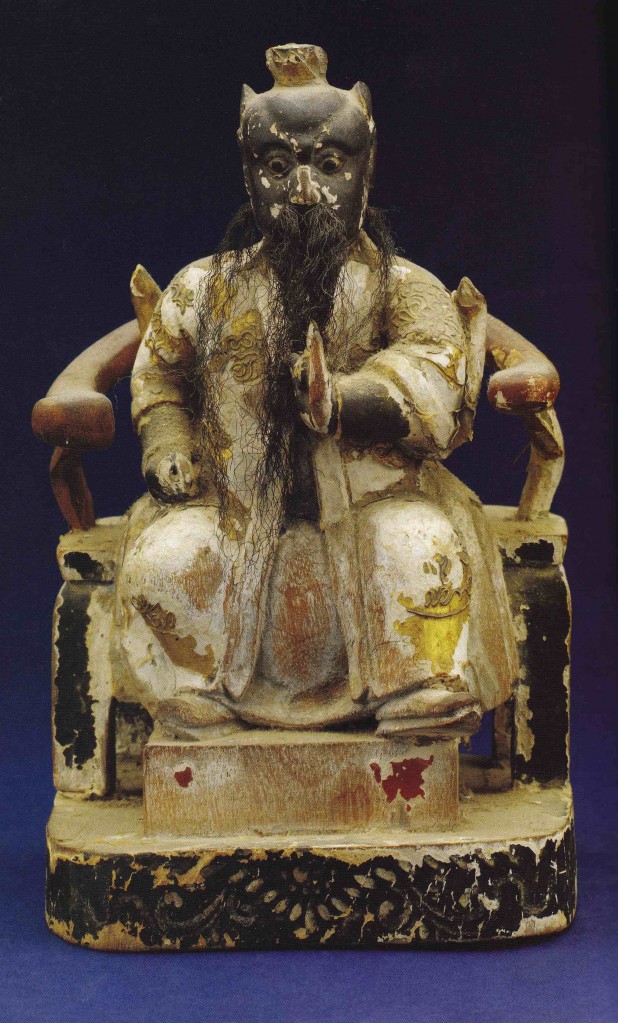Martial Prowess is Health
/ Zhang Tianshi, the first Daoist Priest
Zhang Tianshi, the first Daoist PriestI'm going the state the obvious, or what should be obvious but hardly ever is. In America and Europe, and to some extent in every country that was transformed by the nationalist movements of the early 20th Century, health is most commonly defined as white teeth, glistening bumpy muscles, a loud voice, a firm handshake, the ability to swim, run fast, and lift something heavy.
In China, health was defined as martial prowess.
China did not have the concept of The Red Cross separating doctors from warriors, in fact, a military officer could have medical training and use his martial prowess for healing. Medicine and Theater were also bitten by the same nationalist/modernist movements that redefined health. "Scientific" replaced "martial prowess" as a signifier of good medicine.
Prior to the 20th Century an actor's ability to communicate with his audience happened through his martial prowess. Theater and puppetry were conceived as religious, exorcistic, community healing events infused with martial displays. The deep embarrassment which fueled modernity drove wedges between martial skill, and performance skill.
Daoist Priests from earliest times considered non-aggression and the cultivation of weakness to be central mandates for the performance of ritual. But throughout history divergent traditions of ritual existed side by side. Not just Tangki who gain their prowess through being possessed by a god; but also Fangshi (Barefoot Ritual Experts) whose mandates diverge and converge with Daoist mandates like a knotty braid cascading down through history to our current frizzy ends.
It seems that ritual is made potent through the martial prowess of the gaogong (a priest of high merit). Remember the word gongfu literally means accumulated merit. The mandates of non-aggression and weakness clearly come form the Daodejing, the Huainanzi and other Warring States texts (jing). What these texts suggest is that there is a naturalness inside all of us, which, if allowed to reveal itself, is naturally strong, healthy and potent. It is our aggressive desires and fears which obscure this naturalness. From this point of view it makes perfect sense that someone who keeps the precepts of weakness and non-aggression would be able to unleash natural, spontaneous, martial prowess in rituals of exorcistic healing.
 The Immortal Monkey God, Embodied
The Immortal Monkey God, EmbodiedAgain, to state the obvious, meditation was viewed as a kind of inner martial prowess. And daily gongfu, martial arts practice, had at least the sheen of a mini-exorcism.
And here is where is gets confusing and not so obvious.
This is not to say that all martial arts practices are good for ones health. Nor is it to say that all martial prowess is good for longevity. In fact, going back to those early Warring States texts it would seem that a clear distinction was made between types of martial prowess which were good for longevity and those which shortened ones life. The perception of health and the reality of longevity are not necessarily the same.
Those Warring States texts have never gained wide acceptance, they have always been part of a debate. The argument that through the subordination of ones desires to the state or the family one can develop into a superior man-- has actually held sway over the idea that our true nature, if allowed to flourish without effort, is naturally instilled with martial prowess.
Martial and civil prowess were often seen as measures of the health of the family or the state, whom the individual was subordinate to. The active metaphor being that we are all part of larger "bodies," like family, community, state, world, or cosmos.
Today people say that accepting the fate of becoming a Tangki means accepting a shortened life, but that such a fate will extend the lifespan of your parents! People also say that they are practicing Taijiquan for their own health, and the health of their parents.
Martial prowess is health.
Remember that the next time someone asks you what the "benefits" of doing tai chi are.
